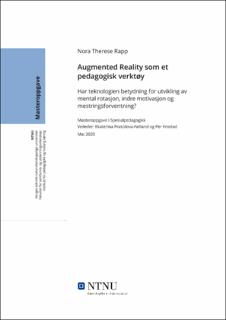| dc.description.abstract | Høsten 2020 tas de nye læreplanene i bruk. Disse vektlegger å utdanne barn til å blant annet ha evne til refleksjon, og være utforskende og kreative. Augmented Reality (AR) er en teknologi som kan være nyttig til nettopp dette. Hensikten med denne studien er derfor å undersøke effekten AR-brillene Microsoft HoloLens har på den spatiale ferdigheten mental rotasjon, indre motivasjon og mestringsforventning. Studien belyser følgende problemstilling: Har bruk av AR-briller som undervisningsmateriale betydning for utvikling av den spatiale ferdigheten mental rotasjon, indre motivasjon og mestringsforventning hos elever i 13-årsalder?
Spatial ferdighet har en sammenheng med matematikkferdigheter, og utvikling av denne vil muligens kunne utvikle elevers ferdigheter i matematikk. For å potensielt gi et bidrag til spesialpedagogikken, blir problemstillingen utdypet gjennom forskningsspørsmål som undersøker forskjeller i utviklingen ut fra kjønn og prestasjonsnivå i matematikk. I tillegg undersøkes opplevelsen av forskningsprosjektet hos to elever med svake ferdigheter i matematikk.
For å samle kvantitativ data benyttes et kvasieksperimentelt pre- og posttest design med bruk av kontrollgruppe. Videre benyttes en pre- og post-spørreundersøkelse som gjennom sammensatte mål måler elevenes indre motivasjon og mestringsforventning. For å samle kvalitativ data brukes et dybdeintervju for å få innblikk i to elevers opplevelse av prosjektet. Utvalget består av 19 elever fra to skoler i Trondheim kommune, hvor 13 er del av eksperimentgruppa og 6 er i kontrollgruppa. På grunn av tiltakene mot Covid-19 ble utvalget dessverre mindre enn det som var ønskelig og gruppefordelingen ujevn.
Funnene fra studien tyder på at AR-briller har liten effekt på utvikling av mental rotasjon. Kontrollgruppa, som brukte tradisjonelle undervisningsmidler som konkreter og oppgaver på ark, hadde en sterkere effekt av tiltakene. Dette kan skyldes at oppgavene var lettere å administrere enn oppgavene med AR, i tillegg til at det var enklere å oppmuntre til refleksjon. Dette kan igjen ha stor betydning for utvikling av metakognitive ferdigheter, noe som kan være særlig nyttig for elever med svake ferdigheter i matematikk. Funnene viste også at guttene har sterkere ferdigheter i mental rotasjon enn jentene. Resultatene viste videre at AR har nær stor betydning for utvikling av indre motivasjon, og en moderat betydning for utvikling av mestringsforventning. Informantene underbygget disse funnene ved å uttrykke at AR er et verktøy som kan gjøre skoledagen mer lystbetont og gøy. Det ble likevel framhevet av den ene informanten at den tradisjonelle undervisningen muligens bidro til mer læring. Av den grunn kan det tenkes at en undervisning som kombinerer bruk av AR og mer tradisjonelle metoder vil kunne bidra til både motivasjon, mestringsforventning og god læring. Dette bør videre forskning undersøke. Videre forskning kan også undersøke effekten ulike AR-medier, for eksempel andre typer AR-briller og PC-basert AR, har på læring. Dette er fordi andre typer AR muligens åpner for flere muligheter og har flere funksjoner enn AR-brillene brukt i denne studien. | |
| dc.description.abstract | In the autumn of 2020, the new curricula, which emphasize educating children to, among other things, have the ability to reflect, and be explorative and creative, will be implemented. Augmented Reality (AR) is a technology that can be useful for this. The purpose of this study is therefore to investigate the effect the AR glasses Microsoft HoloLens has on the spatial ability of mental rotation, intrinsic motivation and self-efficacy. The study highlights the following issue: Does the use of AR glasses as teaching material have significance for the development of the spatial ability of mental rotation, intrinsic motivation and self-efficacy in students of the age of 13?
Spatial ability is related to mathematical skills. Thus, developing the spatial ability may possibly develop students’ mathematical skills. In order to potentially make a contribution to special education, the thesis statement is elaborated through research questions that examine differences in development based on gender and achievement level in mathematics. In addition, two students with low achievement skills are interviewed to gain insight into their experience of the project.
The quantitative data were collected by using a quasi-experimental pretest-posttest with a control group design. In addition, a pre- and post-survey measured students’ intrinsic motivation and self-efficacy. To collect qualitative data, an in-depth interview was used. The sample consists of 19 students from two schools in Trondheim, of which 13 are a part of the experimental group and 6 are in the control group. Unfortunately, due to the measures taken against Covid-19, the sample was smaller than desirable and the group distribution uneven.
The results indicate that AR has a small effect on the development of mental rotation. The control group, that used traditional teaching aids such as concretes and assignments on sheets, had a stronger effect of the measures. These tasks were easier to administrate than the tasks with AR, in addition to the fact that it was easier to encourage to reflection. This, in turn, can be of great importance for the development of metacognitive skills, which can be particularly useful for students with poor mathematical skills. Further, the findings constitute that boys have stronger mental rotation skills than girls. The results also indicate that AR is of great importance for the development of intrinsic motivation, and a moderate importance for the development of self-efficacy. The informants supported these findings by expressing that AR is a tool that can make the school day more pleasurable and fun. However, it was pointed out of by one informant that traditional teaching methods may have contributed to more learning. For this reason, it is conceivable that teaching that combines the use of AR and more traditional methods can contribute to motivation, self-efficacy and good learning experiences. Further research should examine this. In addition, further research should examine the effects different AR media, such as other sorts of AR glasses and desktop AR, have on learning. The reasons are that other sorts of AR may offer more opportunities and include more features than the AR glasses used in this study. | |
